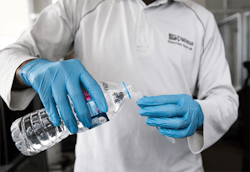Nestlé Waters becomes first beverage company to achieve Alliance for Water Stewardship
GLENDALE, CA, OCT 27, 2017 -- Nestlé Waters has announced that it will strengthen its collaboration with the Alliance for Water Stewardship (AWS) to certify 20 factories by 2020.
The company has already certified four Nestlé Waters bottling facilities in Sheikhupura, Pakistan, and in California (Ontario, Sacramento and Livermore). It plans to certify additional sites in Africa, Asia, Canada, Europe, Latin America, and the United States.
The announcement is part of Nestlé Waters' commitment to continuous improvement of its water stewardship practices, to address shared water challenges and ensure the sustainability of water resources.
AWS is the first global water stewardship standard for measuring responsible water stewardship across social, environmental and economic criteria. In a rigorous certification process, independent bodies verify progress against 30 core AWS criteria.
Created by industry leaders and prominent environmental conservation groups such as The Nature Conservancy and the World Wildlife Fund, the AWS Standard is the first-ever comprehensive global standard for measuring responsible water stewardship across social, environmental and economic criteria.
To date, only eight factories around the world have managed to achieve this certification, including four Nestlé Waters bottling facilities: one in Sheikhupura, Pakistan, and three in California (Ontario, Sacramento and Livermore, CA). The recent certification of the Sacramento, CA factory puts the company on track to certify all five of its California water bottling facilities by the end of 2017 -- the importance of which is underscored by the shared water challenges facing the area, including a recent five-year drought.
The company also plans to certify additional sites in Africa, Asia, Canada, Europe, Latin America, and the United States as part of its 2020 commitment. Nestlé Waters is one of the first global companies -- and the first beverage company – to certify sites against the AWS Standard, and to commit to certifying a large number of sites within a fixed timeframe.
The announcement represents an important step towards Nestlé Waters' commitment to continuous improvement in their water stewardship practices, helping to address shared water challenges and ensuring the sustainability of water resources.
Adrian Sym, AWS CEO says: "Nestlé Waters' strategic commitment to implementing the AWS Standard sets an example, demonstrating the importance of water stewardship and the business benefits it can deliver. Through our global membership, we will be calling on and supporting other major businesses to follow Nestlé Waters' lead in making meaningful and independently verifiable contributions to our shared water challenges through implementation of the AWS Standard. "
Maurizio Patarnello, Nestlé Waters CEO: ""Collaborating with AWS is a new step on our water stewardship journey which will allow us to further engage with local communities to secure the sustainability of the local water resources where we operate. By broadly implementing this Standard, we will pave the way and show that meaningful collaboration is possible for the future of water.''
Launched in 2014 by industry leaders, public sector agencies, academic institutes, and prominent environmental conservation groups such as The Nature Conservancy and the World Wildlife Fund, AWS is the first global Water Stewardship Standard for measuring responsible water stewardship across social, environmental and economic criteria.
The rigorous process to become AWS certified further illustrates Nestlé Waters' continued commitment toward water stewardship. Certified sites' progress against the 30 Core AWS criteria is verified by credible, independent, third party certification bodies.
